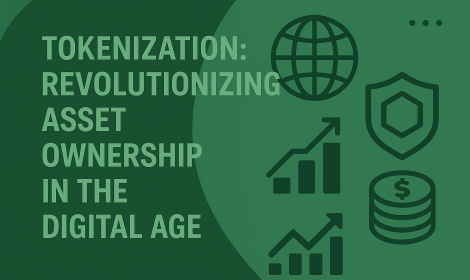Tokenization: Revolutionizing Asset Ownership in the Digital Age
Autor: Ondřej, 19.06.2025This article explores how tokenization transforms traditional investment by converting asset ownership into digital tokens. It examines how tokenization provides inflation resistance through asset backing while offering benefits like ownership flexibility, risk diversification, and accessibility to premium investments with lower capital requirements. The article also highlights the strategic advantages of co-ownership in tokenization platforms, including decision authority and access to global investment opportunities

The emergence of tokenization represents a fundamental shift in how investments can be structured, accessed, and managed. This final article explores how tokenization addresses many traditional investment challenges and examines the unique benefits of becoming a co-owner in a global tokenization platform.
Understanding Tokenization
Tokenization refers to the process of converting rights to an asset into digital tokens on a blockchain or similar technology. Unlike cryptocurrencies, which primarily function as mediums of exchange, asset-backed tokens represent ownership in tangible assets with intrinsic value. This creates several distinct advantages:
Inflation Resistance: Unlike fiat currency, tokens tied to physical assets can maintain or increase their real value during inflationary periods, as the underlying assets often appreciate alongside rising prices.
Asset Backing: Tokens derive their value from the underlying assets they represent, whether real estate, commodities, art, or business equity. This provides fundamental value beyond speculative market movements.
Ownership Flexibility: Traditional asset ownership often involves significant barriers including high minimum investments, complex legal structures, and limited liquidity. Tokenization enables fractional ownership, simplified transfer mechanisms, and potentially enhanced liquidity.
The Multi-Dimensional Benefits of Tokenization
Tokenization provides solutions to numerous traditional investment challenges:
Privacy Preservation: Depending on the specific implementation, token ownership can offer enhanced privacy compared to traditional registered securities or property ownership.
Risk Dilution: By enabling fractional ownership of high-value assets, tokenization allows investors to distribute capital across multiple investments, reducing concentration risk.
Accessibility: The fractional nature of tokens enables participation in premium asset classes with substantially lower capital requirements than traditional methods.
Asset Diversification: Almost any asset with value can potentially be tokenized, creating unprecedented diversification opportunities across traditionally separate markets.
Co-Ownership in Tokenization Platforms
Beyond simply purchasing tokens, becoming a co-owner in a tokenization platform itself presents a strategic position in this emerging ecosystem. This approach offers unique advantages:
Decision Authority: Co-owners typically gain governance rights over the platform, influencing which assets are tokenized and how the system operates.
Collective Asset Management: Leveraging the combined expertise and resources of multiple stakeholders creates efficiency and opportunities beyond individual capabilities.
Expanded Investment Universe: Co-ownership often provides priority access to high-value assets that would be inaccessible to individual investors due to scale, networks, or specialized knowledge.
Global Perspective: Leading tokenization platforms operate internationally, providing exposure to global opportunities and market intelligence typically unavailable to retail investors.
Implementation Considerations
While tokenization offers compelling advantages, practical implementation involves important considerations:
Regulatory Compliance: Token structures must navigate evolving regulatory frameworks across multiple jurisdictions.
Technical Security: The digital nature of tokens necessitates robust cybersecurity measures to protect ownership rights.
Valuation Transparency: Effective tokenization requires reliable, transparent valuation mechanisms for the underlying assets.
Liquidity Development: Secondary markets for tokens continue to evolve, with liquidity varying significantly across different platforms and asset types.
Conclusion
Tokenization represents a transformative approach to investment that addresses many traditional limitations while creating new possibilities for wealth preservation and growth. By enabling fractional ownership, enhancing liquidity, and democratizing access to premium asset classes, tokenization platforms are reshaping the investment landscape. For investors concerned about inflation and seeking diversified exposure to real-world assets, tokenization offers a compelling modern solution that merits serious consideration.